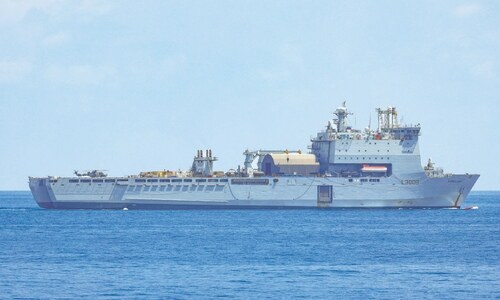WASHINGTON: A diplomatic stand-off between China and the Philippines that flared up two years ago in a dispute over fishing rights at a tiny shoal in the South China Sea is coming to a head after Manila decided to ignore Chinese threats and sue Beijing in an international tribunal.
The legal case marks the first time that an arbitration panel will examine China’s claims to most of the South China Sea, one of the world’s busiest byways for shipping and a potentially rich source of oil and natural gas.
The suit, filed before the Permanent Court of Arbitration in The Hague, amounts to what is basically an existential question about rocks. Or rather, it’s about the Philippines’ desire for scores of specks in the South China Sea to be officially classified by the international panel as rocks, rather than islands. On such arcane definitions can hang the fate of nations — or in this case, the extension of economic rights of states to the seas and the seabed off their coasts.
Simply put, islands are land, which entitle their owners to enjoy exclusive economic rights for 200 nautical miles in all directions, including rights to fishing and energy extraction. Rocks aren’t, and don’t.
If the tribunal rules against the Philippine claim then the stakes in the battle for those specks of land would be much higher: whichever side eventually has its claims to the specks recognised by international law would be able to lay claim to vast areas potentially rich in resources. If Beijing loses the case it will have to choose whether to abide by an international court or ignore its ruling and claim those seas anyway.
It hasn’t started well. China has refused to participate in the international arbitration, and has several times admonished Manila for what it calls “unilateralism” and “provocation”. Beijing summoned the Philippine ambassador last week for a tongue-lashing, two days after Chinese coast guard vessels tried unsuccessfully to block a Philippine resupply run to another disputed shoal.
Much of the world is watching. The United States has expressed support for the Philippines’ effort to seek arbitration under international laws governing the use of the sea; Japan, embroiled in its own volatile territorial dispute with China over the Senkaku Islands in the East China Sea, has also publicly backed Manila. But other countries in Southeast Asia, who have their own territorial disputes with China, have stayed quiet so far.
The case is meant as a frontal challenge to China’s infamous “Nine-dashed line”, Beijing’s vague but threatening effort to lay claim to nearly the entirety of the South China Sea to the detriment of neighbours, including the Philippines, Vietnam and Malaysia. Beijing inherited that map, and its ambitious claims, from the Nationalist government it defeated in the Chinese civil war in the 1940s. The expansive map has even become a fixture inside new Chinese passports.
Many scholars, though, think that China’s claims are essentially bunk. The Law of the Sea Convention, which China signed and ratified, abolished the idea of historical claims as a way to determine maritime rights. Not surprisingly, Paul Reichler, the Washington lawyer who helped craft Manila’s lawsuit, agrees. China, he says bluntly, “is violating international law and the [Law of Sea] Convention.”
The suit doesn’t seek to determine who actually owns the disputed specks of land, which include, fittingly enough, Mischief Reef. Instead, the issue is who owns the waters around them. Manila argues that the waters between its shores and the specks belong to the Philippines, because they are inside the 200-mile exclusive economic zone every country has. China says those waters belong to it.
The suit has enraged Beijing, with the Chinese foreign ministry last week vowing that the Philippines will “face consequences” for making its legal case. China says that it has the right to defend its own territory, and any disputes should be settled in a bilateral fashion, rather than through international arbitration.
“No matter how the Philippine memorial is packaged, the direct cause of the disputes between China and the Philippines is the latter’s illegal occupation of some of China’s islands and reefs in the South China Sea,” Zhang Hua, a spokesman for the Chinese embassy in Manila, said in a posting on its website. “The Chinese side is steadfast in defending its territorial sovereignty and maritime interests and rights. The Philippines’ plot is doomed to fail.”
The stand-off is sparking fresh fears of an armed conflict in the region. In recent years, China has ruffled feathers throughout Southeast Asia by pressing what many see as excessive territorial claims, and beefing up its civilian and military forces to back up its aggressive diplomacy.
Particularly acute have been the naval tensions between China’s muscular civilian patrol vessels and the overmatched coast guards of neighbouring states. Experts worry that the lawsuit will prompt Beijing to take an even more aggressive stance in a bid to cow Manila.
Manila’s quest for legal satisfaction in The Hague is an uphill struggle. The arbitration panel can’t impose a settlement, and relies on the acquiescence of both parties to implement any ruling; China has made clear it will not cooperate. But in the court of public opinion, a Philippine victory sometime next year would make it much easier for Manila and Southeast Asian nations to push back against what they see as Chinese encroachment.
Caitlyn Antrim, an expert on the Law of the Sea at the Stimson Center, said: “At some point China will have to choose either to fight for regional control, or global freedom of the seas.”
—By arrangement with Foreign Policy-The Washington Post
















































Dear visitor, the comments section is undergoing an overhaul and will return soon.